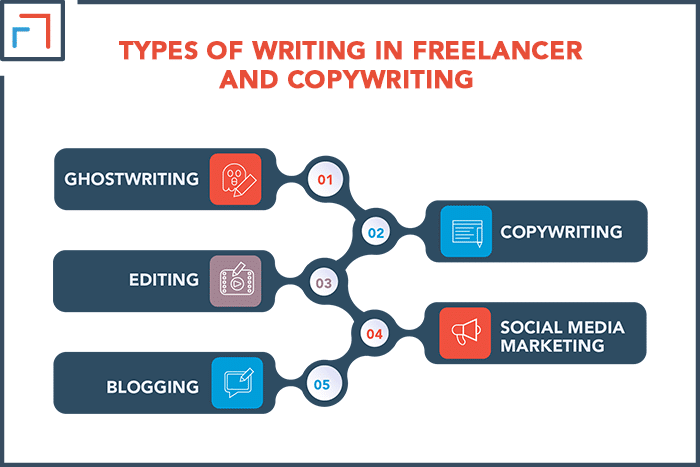Freelance writing and copywriting are highly demanded skills in the online marketing space. If you are thinking about starting a career in writing, you may wonder if you should be a freelance writer or copywriter. Knowing the details of each option can help you make an informed choice.
Freelance writing covers anything a paying client may request. Sometimes copy is among the things you will write, but it may also include site content, speeches, and ebooks. Copywriting, on the other hand, is writing persuasive text for marketing purposes. Copywriters can also work as freelancers.
Some copywriters are freelancers and some freelancers write copy, but the two things are not the same. This post compares freelance writing and copywriting on a deeper level to help you understand how each works.
The Difference Between Freelance Writing And Copywriting
Freelance writing and copywriting are frequently used terms in the online writing industry. While both are forms of writing, they differ in some ways.
It is crucial to understand the similarities and differences of the two, especially when deciding which form of writing to pursue.
1. What Is Freelance Writing?
Freelance writing is a form of writing where a writer works for clients on a self-employment basis.
In this form of writing, a writer can work for a variety of clients or a few specific people if they can offer a steady stream of work. Freelance writers can usually work from their homes.
In addition, freelancers are responsible for seeking out their own clients through methods such as pitching. Work doesn’t usually come to you; you have to go to it.
If you choose to work as a freelance writer, there are several approaches you can take. You can write about anything clients request or you can specialize in a given niche.
Specialist freelance writers may find it easier to get work over time compared to generalist writers. Specializing helps them gather industry knowledge and become an expert in their chosen area.
As a result, the writing process becomes easier and faster.
2. What Is Copywriting?
Copywriting is the art of writing text specifically for marketing purposes. The text is written creatively and persuasively to convince people to take a specific action that would eventually lead to sales.
These actions may vary from downloading material to subscribing to an email list.
The core of copywriting is the ability to persuade people to act. In order to persuade people, you need to understand them. You need to know what keeps them up at night and what kind of solutions excite them.
3. How Does Freelance Writing Differ From Copywriting?
Freelance writing is a general form of writing while copywriting is not. Freelance writers can write about anything that their clients request.
They also dabble in a wide range of formats and styles. Copywriting, on the other hand, is more restrictive. While copywriters can work on different types of copy, their writing must be written to sell.
Since freelance writers can write about anything, some of them can also become freelance copywriters. Similarly, copywriters can work in-house or on a freelance basis.
As such copywriters can also work on some projects that freelance writers handle. There is overlap between these jobs, but they are not always the same.

Freelance Writing Vs Copywriting: What Is Involved?
Most people assume that writers spend all their time writing. However, that is far from reality. Whether you become a freelance writer or copywriter, there is much to do than just putting words on paper.
1. What Does A Freelance Writer Do?
Freelance writing is a job and the writers are often their own bosses/managers.
Therefore, just like other business owners, the writer has several responsibilities. Below are some key actions that freelancers spend time on.
1.1. Marketing And Networking
At the onset of a freelance writing career, writers must spend time marketing their services in order to attract and win clients.
Marketing and networking are crucial for the success of any freelance writing business. Without clients, there is no business. Writers have to set aside time to promote their services.
The actions taken will vary from niche to niche. Some common marketing actions taken by writers include pitching, social media engagement, guest posting, and applying for advertised jobs.
There is no right or wrong way to look for clients. In the early days, you may have to try every single method out there until you discover what works for you.
As the business grows, freelancers may not need to spend as much time marketing if they do a good job. Delivering great services guarantees repeat clients and referrals.
1.2. Writing, Proofreading, And Editing
Once they have secured writing clients, freelancers now need to write appropriate content. This is where most successful freelancers spend their time because writing more means more pay.
Writing may involve researching, drafting, and other activities.
Once they’re done writing, writers go through their work to check for errors and ensure the work is of good quality.
Since editing is a crucial stage of writing, it may also take up a huge chunk of a freelance writer’s time. Over time, some successful copywriters choose to outsource editing so they can focus on writing more.
1.3. Administrative Duties
Although it is not everyone’s cup of tea, administrative roles are a key part of the business that writers have to undertake.
Some duties include preparing and sending invoices, filing taxes, and following up on payments.
1.4. Professional Development Activities
Finally, writers spend some of their time sharpening their skills. Professional development helps freelance writers to become better at their craft.
In turn, writing high-quality content at a faster pace guarantees higher earnings. It also helps them stay relevant.
2. What Does A Copywriter Do?
Like freelance writers, copywriters play several other roles in addition to writing. Below are some key responsibilities of a copywriter.
Brainstorming: Copywriters work closely with the creative team to come up with concepts for marketing campaigns and ads.
Some of the professionals that copywriters interact with at this stage include the art director and graphic designers.
I have written an in-depth article on where do copywriters work to throw more light on the topic!
Research: Copywriters conduct in-depth research about the target audience, products, competitors, and the industry as a whole. Research enables them to produce high-quality copy that is relevant.
Copywriting, editing, and taking revisions: Copywriters spend a good chunk of their time writing copy while collaborating with the client throughout the process.
Once the copywriter receives suggestions they will revise to the satisfaction of the client.
Copywriters also:
- Perform an analysis of campaign results and offer insights into the future campaign strategies.
- Pitch marketing campaign concepts to stakeholders.
- Write copy in the client’s brand voice.
Freelance Writing Vs Copywriting: What Types Of Writing Do Writers Engage In?
Freelance writers and copywriters can engage in various types of writing. Some specialize in offering a range of formats and topics while others choose to perfect their skills in one area.
Below are the types of writing you need to know about.

1. Types Of Freelance Writing Services And Content
If you choose to become a freelance writer, here are some of the services you may be expected to offer.
Ghostwriting: This service involves writing content such as blog posts, ebooks, and speeches for someone else. This content may also be used by a company, school, or an institution.
The content is published under their name, so this means the writer gets no byline or public credit. Once they get paid, they surrender the ownership rights to the client.
Copywriting: As a freelance writer, you may also write copy for your clients.
Copywriting may involve writing copy for the web, updating a website, writing press releases, creating landing pages, sales pages, and more.
Editing: You can also offer editing services to clients. To do that, you should have an eye for typos and grammatical errors.
In addition to getting rid of flaws, you’ll need to edit pieces of writing to make them more interesting to read.
Social Media Marketing: Some freelancers can also become social media marketers. Some of the roles here may include handling social media accounts on behalf of your clients.
You’ll need to update the accounts regularly to keep up with the changing world of social media.
Blogging: Clients may hire you to manage their blogs for them. In this case, you’ll need to write, edit and publish blog posts on schedule.
2. Types Of Freelance Writing
Now that you know some of the services you can offer as a freelance writer, let’s dive deeper into the types of content you will offer.
In this section, we will break down the forms of writing based on the type of audience and the type of content.
The audience type can be B2B or B2C. The B2B audience is made of businesses targeting other businesses.
The topics here may be complex, hence the need to streamline them into simple step-by-step processes. B2C writing involves business to consumers.
Since this writing type targets regular people, the content is written in an informative and entertaining way.
Examples of clients in the B2C space may include travel blogs, health blogs, and lifestyle publications. Based on the type of content category, here are the most common types of freelance writing:
- Blog posts
- Press releases
- Ebooks
- Case studies
- Email writing
- Product descriptions
- Site content such as about pages and product pages
- Magazine articles
- Whitepapers
- Short projects such as bios
- Editing
- Grant writing
- Social media content
- Technical writing
- Newsletters
- Articles
- Speeches
- Video scripts
3. Types Of Copywriting
Working as a copywriter means you’ll handle different kinds of projects. This calls for a variety of different skill sets.
Understanding the various types of copywriting can equip you with the knowledge you need to execute projects or to pick the right niche to specialize in.
Below are the top types of copywriting you need to know.
If you’re having trouble with picking a copywriting niche, then I have an article on selecting a super profitable copywriting niche.
B2B Copywriting: This format involves writing persuading copy for other businesses interested in your client’s business.
To hack this, you need a thorough understanding of the pain points the businesses are facing. Above all, businesses are represented by people; hence the need to write concisely and engagingly.
B2C Copywriting: B2C refers to writing copy for businesses or companies that sell directly to the consumer.
The role of copywriters here is to understand the target audience and write copy that persuades them to make a purchase.
SEO Copywriting: This discipline involves writing copy that is optimized to rank higher on the search engine result pages.
It includes researching and using the right keywords as well as studying what the competitors are doing etc.
Direct Response Copywriting: This form of copywriting has the aim of getting immediate and quantifiable responses from the target audience.
It is best written in a manner that portrays urgency to get readers to act fast. It should also provide a way to track the results of a campaign.
Ad copywriting: This is a short form of writing that pushes readers to take a specific action like downloading a report or buying a product.
To write effective copy, you need to identify the target audience, the problem at hand, how the product solves the problem, and the action the reader should take.

Other types of copywriting include:
- Creative copywriting
- Product copywriting
- Brand copywriting
- Content marketing
- Email copywriting
- Social media copywriting
- Technical copywriting
Product copywriting and copywriting for social media are two topics that I’ve covered thoroughly in separate articles. Be sure to check them out!
Freelance Writing Vs Copywriting: Top Industries
There are great benefits that come with mastering a few industries as opposed to hopping from one industry to the next.
For instance, specializing in a given topic helps writers learn more about the industry and gain top-level expertise. It is easier for an expert to succeed in the market compared to a non-expert.
As we previously established, a freelance writer can do copywriting and a copywriter can do some of the projects a freelance writer can do. As such, the industries they work in are bound to overlap.
Below are some top industries that freelancers and copywriters should consider.
1. Finance
Finance companies are constantly looking for writers who can simplify complex financial topics.
As financial technology continues to advance, companies are in need of good freelance writers who can interpret data and analyze trends while still keeping it interesting for the audience.
Companies are also coming up with several financial products such as investment courses, financial planning services, and software.
Such businesses need copywriters to prepare their marketing messages and materials.
2. Health
As more and more people become conscious of their health, they consume more health-related content. It’s always in demand!
Health companies need freelance writers who can decode technical medical knowledge and write it in an informative and easy-to-understand way.
Health companies also frequently run promotional campaigns for their vitamins, machines, books, and more.
Copywriters help them to persuade the target audience to purchase their products. Companies need copy to bring out their USPs so they can stay ahead of the competition.
3. Technology
Technology is a big industry that keeps advancing, making it challenging for consumers to keep up. Technology companies need to market regularly to keep their target audience informed and updated.
The industry requires people who can understand and write about technology
Technology businesses such as those operating as SaaS need freelance writers and copywriters to help them create awareness around their products and persuade more people to buy in.
This industry also spills into other sectors like health and finance. This makes it a great choice for many writers.
4. Startups
Startups need to publish lots of content to build and boost their online presence. Hiring freelance writers is a great option for budding businesses that need to keep costs low while maximizing returns.
Startups can also benefit from copywriting services that help them craft marketing messages that are memorable.
They also need powerful messages to help them get funding for their budding businesses. Just make sure the expectations are clear from the beginning when you’re working with a startup.

Wrapping It Up
A freelance writer writes about anything their clients need. They need to be well-versed in many different forms of writing. This means a freelance writer can also be a copywriter.
Therefore the two careers have a lot in common such as the industries they work in. They also share certain skill sets, such as good grammar and research skills.
Freelance writing and copywriting both enable writers to work in one or more industries. For the best results, it is best to start with general forms of writing.
This will help you figure out what type of writing works best for you. With time, you can then specialize in your preferred skill and industry.
